NEUROSCIENCE GRADUATE PROGRAM TRAINEES (NGP)
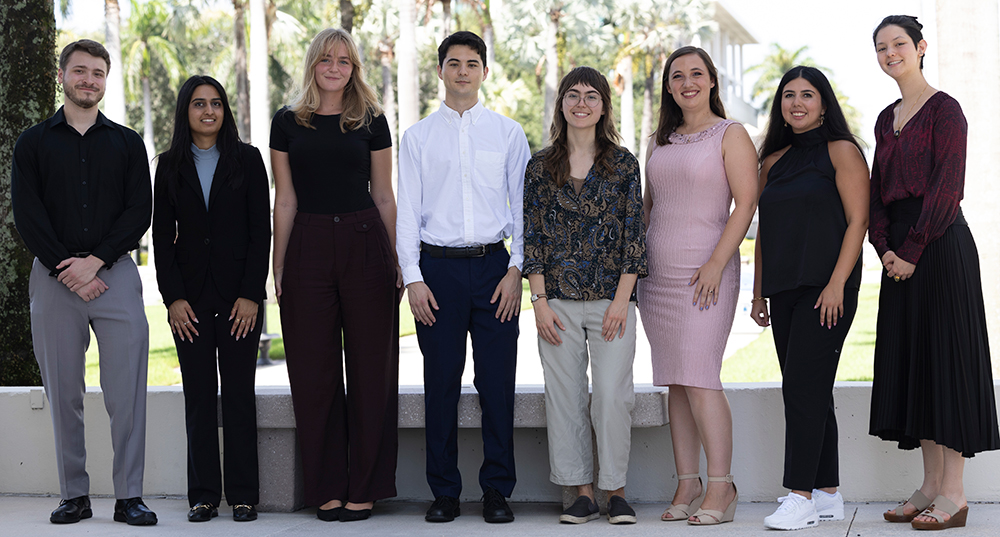 Institute Neuroscience Graduate Trainees (NGP) 2024
Left to Right: Mason Martin, Dhara Patel, Hannah Murphy, Aidan McDonald, Belle Origlio, Kaylee Nott, Gabriella Smith, and Kat Sankey
Institute Neuroscience Graduate Trainees (NGP) 2024
Left to Right: Mason Martin, Dhara Patel, Hannah Murphy, Aidan McDonald, Belle Origlio, Kaylee Nott, Gabriella Smith, and Kat Sankey
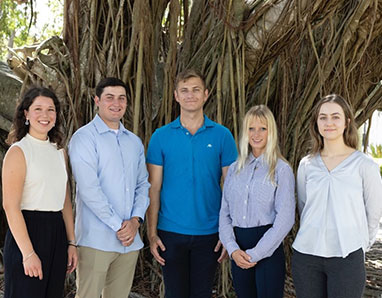 Institute Neuroscience Graduate Trainees (NGP) 2023
Left to Right: Belle Krubitski, Tyler Sarovich, Andy Crider, Alina Dreps, and Tessa Dallo
Institute Neuroscience Graduate Trainees (NGP) 2023
Left to Right: Belle Krubitski, Tyler Sarovich, Andy Crider, Alina Dreps, and Tessa Dallo
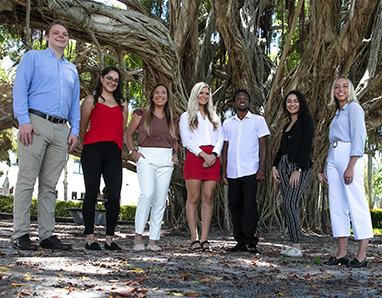 Institute Neuroscience Graduate Trainees (NGP) 2022
Daniel Van Zant, Alejandra Quintero, Claudia Alvarez/2021, Kayleigh Biegler, Ty Roachford, Luiza Sao Pedro Romero, and Valorie Wiseman
Institute Neuroscience Graduate Trainees (NGP) 2022
Daniel Van Zant, Alejandra Quintero, Claudia Alvarez/2021, Kayleigh Biegler, Ty Roachford, Luiza Sao Pedro Romero, and Valorie Wiseman
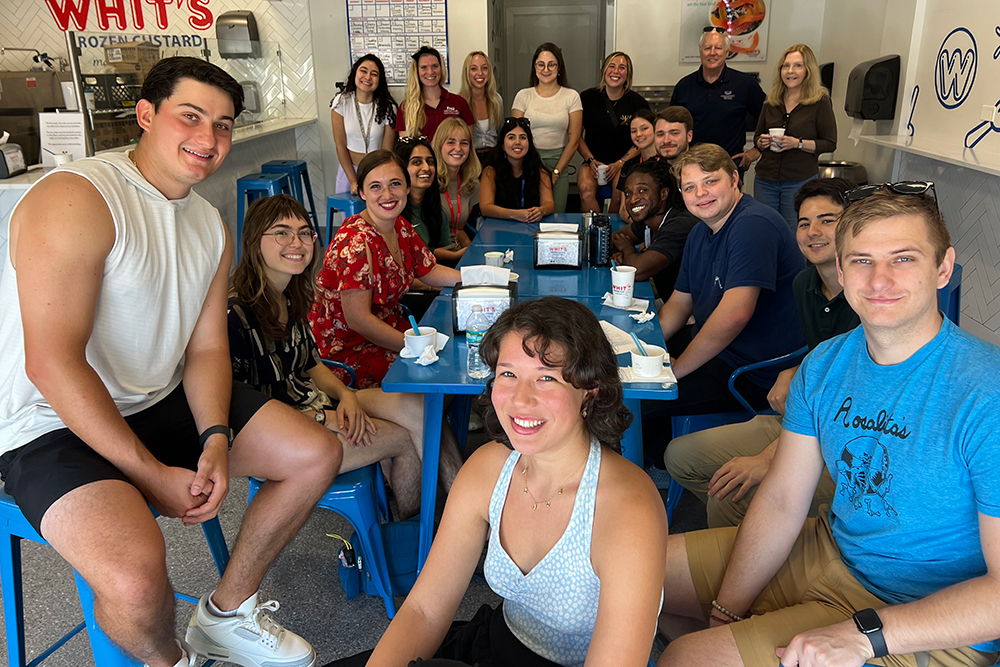 Neuroscience Graduate Program Cohort – 2024 Ice Cream Social
Left Around Table: Tyler Sarovich, Belle Origlio, Kaylee Nott, Dhara Patel, Hannah Murphy, Gabriella Smith, Kat Sankey, Mason Martin, Ty Roachford, Daniel van Zant, Aidan McDonald, Andy Crider, and Belle Krubitski
Neuroscience Graduate Program Cohort – 2024 Ice Cream Social
Left Around Table: Tyler Sarovich, Belle Origlio, Kaylee Nott, Dhara Patel, Hannah Murphy, Gabriella Smith, Kat Sankey, Mason Martin, Ty Roachford, Daniel van Zant, Aidan McDonald, Andy Crider, and Belle Krubitski
Standing: Luiza Sao Pedro Romero, Kayleigh Biegler, Valorie Wiseman, Alejandra Quintero, Claudia Alvarez, Dr. Randy Blakely, and Dr. Kathleen Guthrie
INSTITUTE NEUROSCIENCE GRADUATE PROGRAM TRAINEES (NGP)
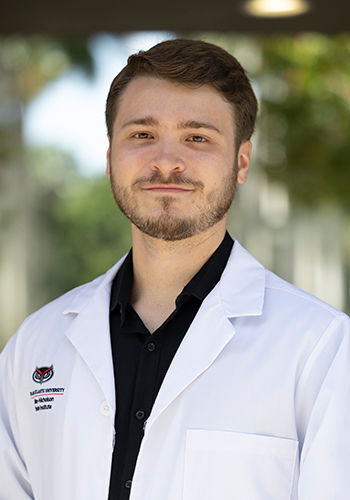
Entered: Neuroscience Graduate Program NGP 2024
Mentor: Unassigned
Lab Rotation: Randy Blakely, Ph.D.
Thesis Topic: TBD
BS Biomedical Sciences/Neuroscience, University of Central Florida, Orlando
I majored in Biomedical Sciences with a focus in Neuroscience at the University of Central Florida. During my undergraduate studies, I investigated the effects of vitamin C and oxidative stress in neural progenitor cells.
After graduating from UCF, I joined Dr. Matthew Disney’s lab as a postbaccalaureate fellow at The Herbert Wertheim UF Scripps Institute for Biomedical Innovation and Technology. During my postbaccalaureate studies, I investigated chemical probing of structured RNA regions within the SARS-CoV-2 genome.
I joined the FAU Neuroscience Graduate Program with the aim of transitioning from molecular to behavioral research. I was attracted to FAU because of the breadth of Neuroscience research areas including molecular, behavioral, and computational studies. My overall goal is to understand ligand-receptor interactions from the molecular to behavioral level.
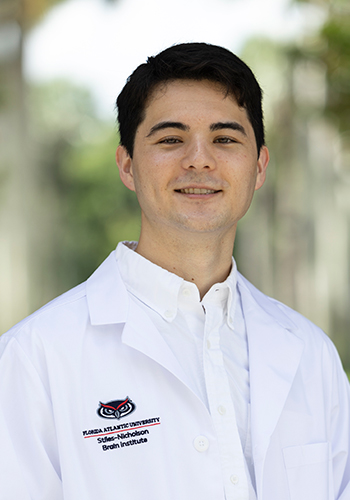
Entered: Neuroscience Graduate Program NGP 2024
Mentor: Unassigned
Lab Rotation: Henriette van Praag, Ph.D.
Thesis Topic: TBD
BS Cell Biology, University of California Davis
"As an undergraduate at UC Davis, I majored in cell biology and volunteered in Dr. Neil Hunter's lab to help study how homologous recombination is modulated during meiosis. After graduation, I worked as a research assistant in the lab of Dr. Fred Gage at the Salk Institute to support research characterizing the molecular signature of memory in the dentate gyrus. In the future, I would like to continue investigating memory as well as its dysfunction in neurodegenerative disease.
I was attracted to the NGP program because of the fascinating research conducted by faculty in the program, the emphasis on mentoring, and the collaborative campus environment."
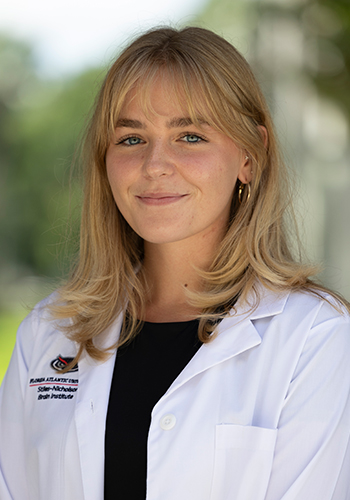
Entered: Neuroscience Graduate Program NGP 2024
Mentor: Unassigned
Lab Rotation: Robert Stackman
Thesis Topic: TBD
MS Experimental Psychology, Nova Southeastern University
BS Psychology, University of Indianapolis
"I earned a B.S. in Psychology from the University of Indianapolis, followed by a M.S. in Experimental Psychology from Nova Southeastern University where I explored genetic variation in the COMT gene as associated with dopamine and subsequent stress responses. During this time, I worked as a research assistant in the neuroscience lab of Dr. Jaime Tartar, employing molecular biology methodologies to explore stress, inflammation, and cognitive function in human participants.
My research interests surround the cellular and molecular underpinnings of cognitive functions like memory and attention, with a particular interest in genetic model systems. I aim to uncover preclinical insights that could lead to therapeutic applications for neurological disorders marked by cognitive impairment.
I was drawn to the interdisciplinary structure of the Neuroscience Graduate Program at FAU, as well as the diverse range of high-caliber faculty and impactful research. Additionally, the lab rotations during the first year provide an appealing quality of both exploration and hands-on experience that further cement the NGP as my ideal program."
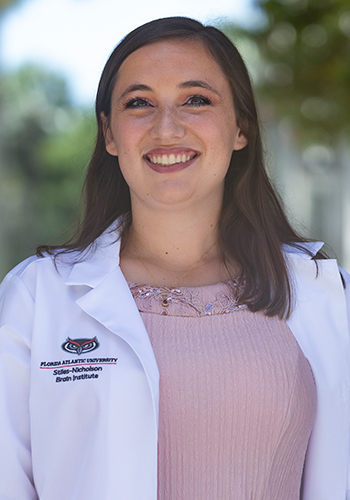
Entered: Neuroscience Graduate Program NGP 2024
Mentor: Unassigned
Lab Rotation: Teresa Wilcox
Thesis Topic: TBD
BS Biology/Chemistry, University of Charleston, West Virginia
"I began my academic venture by obtaining my bachelor's degree in biology and chemistry at the University of Charleston. During my undergraduate studies, I worked alongside Dr. Julie Brefczynski-Lewis on innovative brain imaging technologies, including the Bedside PET Scanner and the PET Helmet. In 2021, we demonstrated the Bedside PET Scanner's clinical viability, while in 2022, we studied physiological stress responses to in-person versus virtual interactions using EEG and respiratory data. By 2023, our research culminated in achieving the world's first brain scan with free movement in a virtual reality setting. These experiences highlighted the potential of portable, affordable neuroimaging devices to improve healthcare access in underserved areas. As a West Virginia native, I am driven to develop sustainable neuroscience technologies that benefit rural and diverse populations, aiming to advance understanding and treatment of neurological disorders with a particular interest in pediatric epilepsy. I was attracted to NGP due to their vast number of resources and the research that they are involved in."
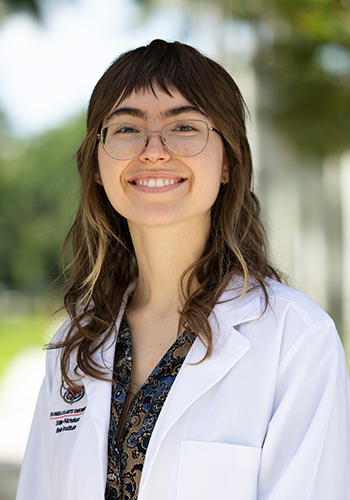
Entered: Neuroscience Graduate Program NGP 2024
Mentor: Unassigned
Lab Rotation: Alan Kersten, Ph.D.
Thesis Topic: TBD
BA Neuroscience, New College of Florida
"I majored in Biopsychology/Neuroscience at New College of Florida. As an undergraduate, I investigated white matter pathways in cetaceans (dolphins and whales). I am particularly interested in the neurological bases of complex social interactions. Examining the brains of multiple cetacean species can reveal patterns between underlying neural connectivity and observable social behaviors.
The neuroscience program at FAU appealed to me because of its thoroughly interdisciplinary nature. I was attracted by the collaborative environment and access to faculty and resources across multiple interconnected disciplines of neuroscience."
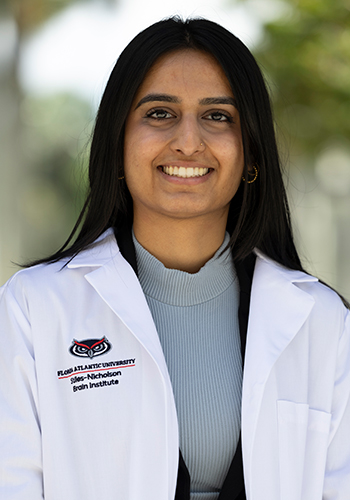
Entered: Neuroscience Graduate Program NGP 2024
Mentor: Unassigned
Lab Rotation1: Gregg Fields, Ph.D.
Lab Rotation 2: Ning Quan, Ph.D.
Thesis Topic: TBD
BS Psychology / Biology, East Tennessee State University
"In my undergraduate program, I had the privilege to work in Dr. Jerry Deehan's Addictions of Pharmacology lab on various projects relating to adolescent alcohol use disorder, flavored conditioned cues associated with alcohol in adulthood, associative learning model, and overall behavioral neuropharmacology. My current research focus pertains to the molecular and cellular aspect of neurodegenerative diseases, particularly Alzheimer's disease by manipulating glial cells.
I was attracted to the NGP at FAU due to its connections with Max Planck Florida Institute for Neuroscience, allowing exemplary resources that could benefit students. There are a vast number of neuroscience researchers with the NGP that utilize the interdisciplinary and collaborative approach to science, which encouraged me to join."
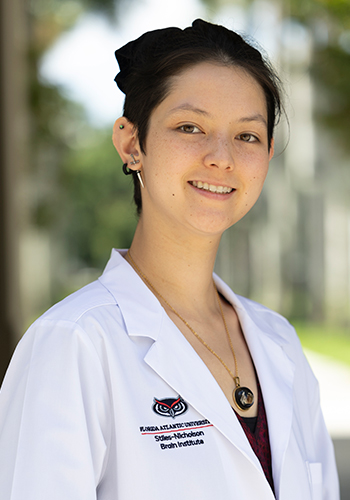
Entered: Neuroscience Graduate Program NGP 2024
Mentor: Unassigned
Lab Rotation: Erik Duboue, Ph.D.
Lab Rotation: Lucia Carvelli, Ph.D.
Thesis Topic: TBD
BS Behavioral Neuroscience/ Psychology, Florida International University
“I majored in Behavioral Neuroscience at Florida International University. My overall goal is to gain as much knowledge and experience within my areas of interest: cellular/molecular pathways in neurodegenerative diseases (Parkinson's and Alzheimer's). I have a particular interest in holistic treatments for chronic conditions to help alleviate debilitating symptoms in their everyday lives.
During my time at FIU, I was privileged to work and gain experience in two different labs: neurocircuitry/cognition memory lab and a Parkinson's lab. Within the memory neurocircuitry lab I gained hands on experience with rats in an 2-4 odor sequence memory task. Within the Parkinson's lab I gained more technical lab experience: immunofluorescent staining, traditional western blotting, and genotyping. I even worked on a personal project that compared autophagy in primary astrocytes and microglia using a manganese treatment.
I was drawn to the NGP because of its interconnectedness with Max Planck resulting in a multidisciplinary approach to research. This allows for a very connected community across all FAUs campuses. I am looking forward to my first two lab rotations with Dr. Erik Duboue and Dr. Lucia Carvelli to strengthen my skills and gain invaluable guidance.”
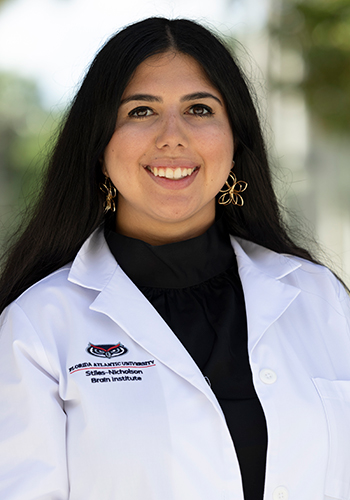
Entered: Neuroscience Graduate Program NGP 2024
Mentor: Unassigned
Lab Rotation: Randy D. Blakely, Ph.D.
Thesis Topic: TBD
BS Neuroscience, Indiana University Bloomington
"I graduated from Indiana University with a B.S. in Neuroscience with departmental honors. As an undergraduate research assistant, I worked in Dr. Anna Kalinovksy's Lab, investigating how dysregulation in endocannabinoid signaling in the cerebellum is associated with neurodevelopment disorders like autism spectrum disorder. In the cannabinoid field, I concentrated on cellular, molecular, and behavioral neuroscience. My interests include neurodevelopment disorders, neuropsychiatric disorders, pain, and addiction. My overall goal at FAU is to understand the cellular and molecular mechanisms that contribute to neuropsychiatric disorders that are comorbid with chronic pain.
I was drawn to the NGP at FAU because of the wide variety of cutting-edge research conducted across multiple institutions. I appreciate the opportunity to conduct rotations across three different labs to find the best lab to suit me. Many of the labs in the NGP align with my research interests and use techniques that I am eager to perform."
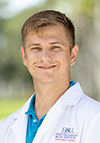
Entered: Neuroscience Graduate Program NGP 2023
Mentor: Ning Quan, Ph.D.
Thesis Topic: TBD
MS Neuroscience, Tulane University
BS Neuroscience/Cognitive-Computational, Ohio State University
“I am pursuing my research with Dr. Ning Quan, investigating the role of IL-1 in the progression of psychopathic and neurodegenerative disorders, and how its modification affects cell survival. I will be helping to achieve these goals using state of the art transgenic mouse models, IHC and behavioral tests. I am currently working to develop my thesis project, collecting data on a familial Alzheimer’s model.
My goal is to improve the understanding of neurodegenerative disease progression by studying the brain's immune response. I obtained my undergraduate degree in neuroscience from Ohio State University, where I actively participated in research projects within Andy Fischer's lab, specifically focusing on retinal regeneration. During my time in the lab, I was deeply involved in projects centered around investigating cell fate changes and proliferation.
Furthermore, I successfully completed Tulane University's esteemed Neuroscience Master’s program. During my time there, I had the privilege of collaborating with Dr. Rebecca Solch-Ottaiano on her studies exploring the intricate relationship between diet, the resulting microbiome, and cognitive function to identify risk factors for Alzheimer's disease.
My interest in the Neuroscience Graduate Program (NGP) was sparked during my master’s program at Tulane, as my advisors highly recommended it. The program further captured my attention due to its emphasis on students' growth through rotations and the vibrant collaborative environment fostered by the faculty and fellow students, as I experienced during my visit. I was able to rotate in three labs in my first year with Dr. Ning Quan, Dr. Randy Blakely, and Dr. Greg Macleod. I learned not only of the highly cooperative space that FAU fosters through joint lab grants, but also dopaminergic and serotonergic functional/developmental interplay in Dr. Blakely’s Lab, the function of calcium and mitochondria in fundamental neuroscience using a drosophila model with Dr. Macleod, and the intersection of the central and peripheral immune system in mice with Dr. Quan’s lab.”
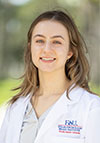
Entered: Neuroscience Graduate Program NGP 2023
Mentor: Laura Fontenas, Ph.D.
Thesis Topic: TBD
BS Biochemistry/Psychology, University of New Mexico, Albuquerque
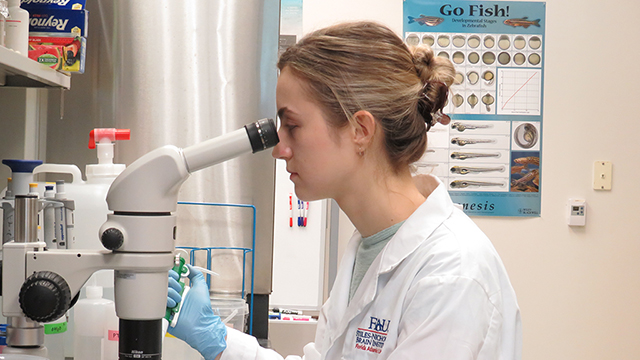
"I am currently pursuing my research with Dr. Laura Fontenas. Using zebrafish as a model organism, I am investigating glial migration at the interface of the central nervous system and peripheral nervous system to elucidate potential demyelinating pathologies and gain a better understanding of myelination mechanisms. Studying glia fascinates me, as they are not well understood, but are implicated in numerous neuropathologies. Specifically, my motivation lies in exploring the medical applications of glia and neuroscience, delving into therapeutic interventions for neurodegenerative diseases.
I graduated from the University of New Mexico with a BS in Biochemistry and a minor in Psychology. As an undergraduate and then as a post-baccalaureate, I worked as a research technologist in the labs of Drs. Anne Ruffing and Chuck Smallwood at Sandia National Laboratories. Here, I used genetic engineering and machine learning based approaches to study and develop energy efficient biofuels.
FAU's NGP excited me because of the compelling research on its campuses, and I knew I wanted to join an interdisciplinary program with lab rotations. In my first year of the NGP, I rotated in the labs of Dr. Gregg Fields, Dr. Randy Blakely, and Dr. Laura Fontenas. In particular, the NGP stood out for its highly collaborative campus located within a growing neuroscience hub.”

Entered: Neuroscience Graduate Program NGP 2023
Mentor: Patrick Grant, Ph.D.
Thesis Topic: TBD
BA Biology/Spanish, Eckerd College, St. Petersburg, FL
"I am pursuing my research in Dr. Patrick Grant's lab in the College of Medicine.
This research is focused on studying the epigenetic mechanism that underlies Sex differences in Addiction as well as looking at how exercise can prevent relapse in Addiction via epigenetic mechanisms.
As an Undergraduate, I majored in Biology and conducted research at Eckerd College. I worked with the model organism Caenorhabditis elegans to study different compounds and their ability to ameliorate Alzheimer's pathology. I am particularly interested in studying Neurological Disorders such as Addiction and how factors such as diet, sex, and exercise influence the propagation of such pathologies. My ultimate goal is to provide knowledge that could create new therapeutic outlets for people struggling with Addiction.
I was attracted to the Ph.D. Neuroscience program at FAU because of its multidisciplinary approach, the opportunity to collaborate with institutions such as Max Planck, and the ability to conduct research rotations during the first year, where I gained crucial and very insightful experience rotating in the labs of Dr. Randy Blakely, Dr. Patrick Grant and Dr. Henriette Van Praag.”

Entered: Neuroscience Graduate Program NGP 2023
Mentor: Rodrigo Pena, Ph.D.
Thesis Topic: TBD
BS Cell & Molecular Neuroscience, Florida State University
”As an undergraduate, I majored in Cell and Molecular Neuroscience at Florida State University. During my time there, I assisted with several different research projects. The first project was looking into the effects that the parietal cortex and anterior thalamic nuclei have on connecting egocentric action to allocentric orientation toward a goal location in the environment. In the same lab, I assisted as well with looking at the coordination and memory of Alzheimer's versus sham rats. My interests include neurodegenerative diseases such as Alzheimer's and Parkinson's, sleep and memory, and machine learning.
The Ph.D. Neuroscience program at FAU attracted me with its outstanding faculty, cutting-edge research, and collaboration with the Max Planck Institute. I was particularly excited about the opportunity to rotate through different labs and learn new techniques during my first year in the program. I had the pleasure of rotating with Dr. Elan Barenholtz, Dr. Rodrigo Pena, and Dr. William Hahn, each of whom provided valuable insights and guidance.
"I am now pursuing my research with Dr. Rodrigo Pena, focusing on modeling the interplay between hippocampal place cells, parvalbumin interneurons, and theta and gamma rhythms which are responsible for encoding and retrieval of spatial memories, and enhancing plasticity within the hippocampus, respectively. Understanding the role of place cells has far-reaching implications, including developing novel strategies for treating neurological disorders affecting spatial navigation and memory, such as Alzheimer's Disease and age-related cognitive decline.
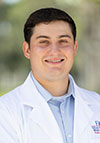
Entered: Neuroscience Graduate Program NGP 2023
Mentor: Jenny Wei, Ph.D.
Thesis Topic: TBD
Membership Coordinator Neuroscience Student Organization
BS Behavioral Neuroscience, University of Kansas
“Under the mentorship of Dr. Jianning Wei, I will be elucidating the molecular pathogenesis of Huntington's Disease. The goal of my research is to aid in the discovery of therapeutic targets and translate scientific insights into clinical applications to benefit patient outcomes. We aim to do so by using human-induced pluripotent stem cells (hIPSCs) as a model to investigate deviations in protein translation and synthesis of this complex disease.
I received my BS in Behavioral Neuroscience from The University of Kansas. Throughout this time, I had the privilege to work in the laboratory of Dr. Zijun Wang, on a variety of projects relating to drug addiction and substance use disorder. Employing a wide range of neuroscience techniques such as whole brain imaging, microscopy, behavioral paradigms, and biochemical assays our work focused on discovering novel therapeutic targets for Opioid Substance Use Disorder. My current research interests are centered on the molecular mechanisms underlying neurodegenerative diseases, particularly Huntington’s disease; a rare, but fatal neurodegenerative disease comprised of progressive degeneration of Medium Spiny Neurons in the Basal Ganglia.
I was attracted to the NGP at FAU because of its unique partnership with Max Planck as well as the ability to conduct research rotations during the first year with Dr. Greg Macleod, Dr. Alan Kersten, and Dr. Jianning Wei. During these rotations I was able to gain first-hand experience of lab environments and mentorship style in addition to learning a variety of techniques such as Calcium Imaging, Biochemical Assays, and Next Generation Sequencing.
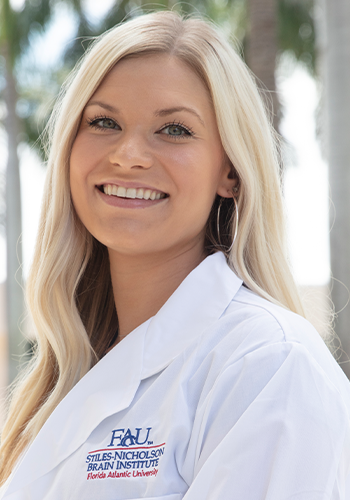
Entered: Neuroscience Graduate Program NGP 2022
Mentor: Patrick Grant, Ph.D.
Thesis Topic: The Epigenetic Mechanism Behind Chemotherapy Resistance in Glioblastoma Multiforme
BS Biology, Eckerd College, St. Petersburg, FL
"I am pursuing my research in Dr. Patrick Grant’s lab in the College of Medicine. Using yeast and human cells, I am investigating the epigenetic mechanisms of resistance to chemotherapy in glioblastomas. As an Undergraduate, I majored in Molecular Biology with a minor in Marine Science and conducted research at Eckerd College and the University of Iowa. I used the model genetic organism, Caenorhabditis elegans, to investigate signal transduction and pathology. My interests ranged, including stem cell research, addiction, and brain cancer.
I was attracted to the Ph.D. Neuroscience Program because of their multidisciplinary approach. My lab rotations included working with Dr. Randy D. Blakely, Dr. Andy Khamoui, and Dr. Patrick Grant. Since I was interested in several different branches of neuroscience, having the opportunity to have a lab rotation within each interest helped me find my specific path in neuroscience for my dissertation work. I am honored to have the opportunity to work with so many resources from several institutes, such as the Brain Institute and Max Planck."
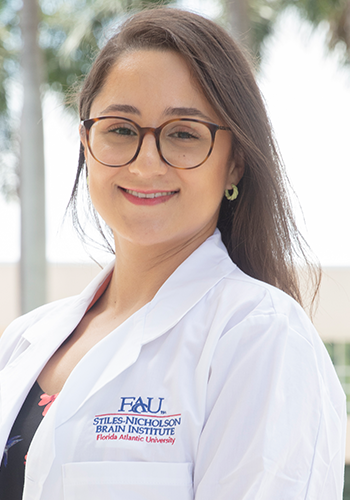
Entered: Neuroscience Graduate Program NGP 2022
Mentor: Chad Forbes, Ph.D.
Thesis Topic: TBD
BS Behavioral Neuroscience/Psychology, Nova Southeastern University, Fort Lauderdale, FL
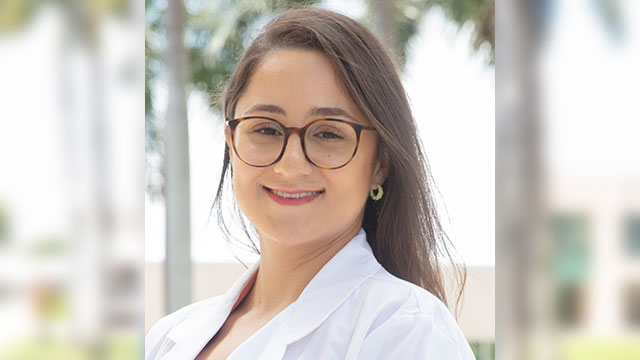
"I am investigating the cognitive and psychosocial symptomatology associated with long COVID. The objective of my research is to determine the potential therapeutic benefits of photo biomodulation in alleviating symptoms within these domains for long COVID patients, under the mentorship of Dr. Chad Forbes.
During my first year in the NGP I was given the opportunity to rotate with Dr. Julie Pilitsis, Dr. Henriette van Praag, and Dr. Carmen Varela. The lab rotations offered through the neuroscience graduate program (NGP) presented the opportunity to explore various research domains, assisting me in selecting the lab where I am currently conducting my studies with Dr. Forbes. As an undergraduate, I majored in Behavioral Neuroscience with a minor in Psychology at Nova Southeastern University. During that time, I worked on a research project aimed to investigate neural and behavioral differences in executive function between bilinguals and monolinguals as well as reveal the relationship between inhibition and linguistic balance.
I was attracted to the Ph.D. Neuroscience program not only because of its cross-disciplinary nature but also due to the unique two-way partnership between FAU and Max Planck. Through NGP I look forward to collaborating across different areas of research and becoming involved in the numerous community outreach programs available through this institution."
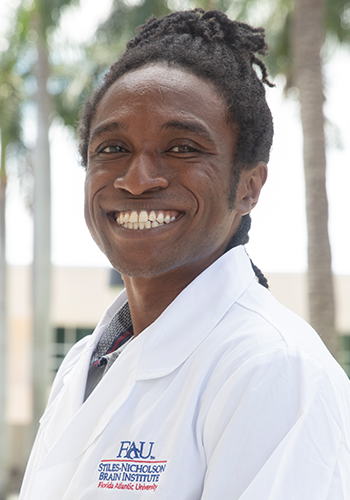
Entered: Neuroscience Graduate Program NGP 2022
Mentor: Rodrigo Pena, Ph.D.
Thesis Topic: TBD
BS Behavioral Neuroscience/Psychology, Nova Southeastern University, Fort Lauderdale, FL
"Under the mentorship of Dr. Rodrigo Pena, I am developing a novel framework for creating computational models of neuronal bioenergetics to study the role of bioenergetics in influencing neural morphology and activity. The framework uses insights from neuroscience and thermodynamics to organize existing computational models into a single cell model that accurately reflects bioenergetic constraints. This framework will be used to understand how bioenergetic dysfunction leads to cognitive and neurodegenerative disorders like Alzheimer’s, Parkinson’s and Huntington’s.
More generally, I am interested in the problem of “Open-Ended Evolution”, that is, how to create a computer program that, like our universe, starts simple and grows indefinitely complex. Towards that end I use constructor theory to create thermodynamic models of evolutionary processes to gain insight into the precise physical requirements for open-ended evolution.”
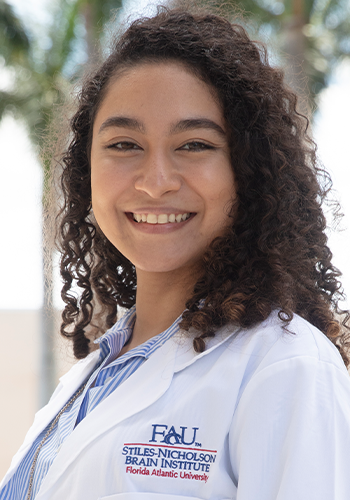
Entered: Neuroscience Graduate Program NGP 2022
Mentor: Wen Shen, Ph.D.
Thesis Topic: Different Cell Types and Functional Relevance of a Novel Subgroup of Retinal Ganglion Cells
BS Neuroscience & Behavior, Florida Atlantic University
"I was excited that I was able to experience three different labs in my rotations with Dr. Wen Shen, Dr. Jang (John) Wu, and Dr. Howard Prentice in my first year in the NGP. I am particularly interested in Neurophysiology, which studies the nervous system function. To be more specific, I am fascinated with studying synapses, which assist in neural communication, and neuroplasticity, concerning the change or reorganization of neural networks. I am also interested in the morphology of neurons, connecting their function to how they are structured. Currently, I am being mentored by Dr. Wen Shen while researching neurons in the mouse retina. Dr. Shen has been assisting me on using electrophysiology techniques, such as voltage clamp and patch-clamp, to study these retinal cells. My goal is to study the neural mechanism of a new subtype of neurons in the mouse retina that expresses the receptor tyrosine kinase by using Cre techniques and intravitreal injections of AAV-GFP to differentiate neuron morphology and different drugs to identify their function and synaptic activity.
I was attracted to the Ph.D. Neuroscience programs because of the ability to have lab rotations. I believe that with these rotations I will gain a lot of research experience and be able to learn new techniques that might assist in my research. In addition to that, I am excited to be part of the FAU Stiles-Nicholson Brain Institute community and participate in the growth of Neuroscience research. I hope you will consider being part of our program, and I am looking forward to the future neuroscientists that will join our community."
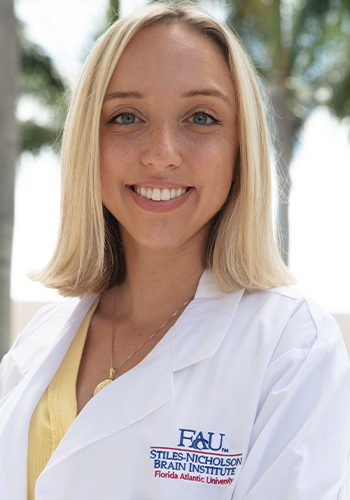
Entered: Neuroscience Graduate Program NGP 2022
Mentor: Summer Sheremata, Ph.D.
Thesis Topic: Hemispheric Asymmetries in Working Memory and Attention When Processing Visual Crowding and Spatial Uncertainty
BS Neuroscience & Behavior/Minor Psychology, Florida Atlantic University
“I am researching contralateral processing biases in working memory and attention. I am interested in understanding how attentional processes are influenced by uncertainty in the visual environment under the mentorship of Dr. Summer Sheremata. The goal of my research is to further our current understanding of how hemispheric asymmetries permeate human cognitive processes and to provide increased awareness of contralateral processing biases in working memory and attention. The long-term objective of my research is to benefit current therapies for attention and visual processing disorders, specifically attention deficit disorder and dyslexia. During my first year with the NGP, I rotated in labs with Dr. Summer Sheremata, Dr. William Alexander, and Dr. Sammy Hong.
As I received my bachelor’s degree from Florida Atlantic University, I already knew firsthand the amazing opportunities FAU offers and how the faculty truly care for their students. I was attracted to the Ph.D. Neuroscience program because of the impressive list of Brain Institute members from various scientific backgrounds. I chose the Neuroscience Graduate Program because of the amazing opportunities and nurturing educators that this interdisciplinary program offers.”
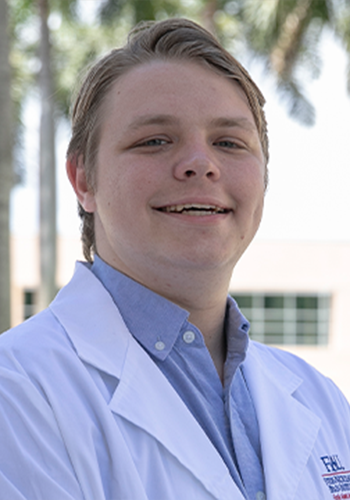
Entered: Neuroscience Graduate Program NGP 2022
Mentor: Elan Barenholtz Ph.D.
Thesis Topic: Using Large Language Models to Automate Drosophila Theory Validation
BS Psychology, Florida State University, Tallahassee, FL
“My primary research interests are using large language models to automate model validation in computational neuroscience. For the validation analysis I am focused on drosophila connectomics data and augmenting the connectomics tool ‘FlyBrainLab’. I am also working with the National Drug Early Warning System on a NIH training grant to predict substance abuse trends by using machine learning on data scraped from online drug discussion forums.
The NGP has an extremely interdisciplinary group of faculty members which has been perfect for putting together my supervisory committee as my dissertation topic is very interdisciplinary. I have gotten the opportunity to take some useful classes from some excellent professors including "Scientific Communication", "Methods in Complex Systems", "Computational Neuroscience" and "Nonlinear Dynamical Systems". My favorite part of the NGP so far has been the many excellent events and networking opportunities. In addition to the events hosted by the Stiles-Nicholson Brain Institute, I have also gotten the chance to attend many events through my affiliation with the The Center for Complex Systems and Brain Sciences, Center for Future Mind, Rubin and Cindy Gruber AI Sandbox, and the Machine Perception and Cognitive Robotics Lab (all of which are hosted here at FAU). In the past year, I have gotten the chance to meet and learn from such great thinkers as Dr. Andre Fenton, Dr. Stephen Wolfram, and Dr. Sara Walker to name a few. FAU also has an impressive network of complex systems neuroscientists that are based right here at the university.
During my first year, I was able to rotate with Dr. Barenholtz and Dr. Hahn, Dr. Dawei Li, and Dr. Behnaz Ghoraani. All of them are doing fascinating dry lab brain research which uses state of the art machine learning methods. Although my final choice of lab was Dr. Barenholtz and Dr. Hahn’s Machine Perception and Cognitive Robotics Laboratory (MPCR), I was glad to be able to make connections and learn some of the methods employed in multi-omics and biotechnology.”
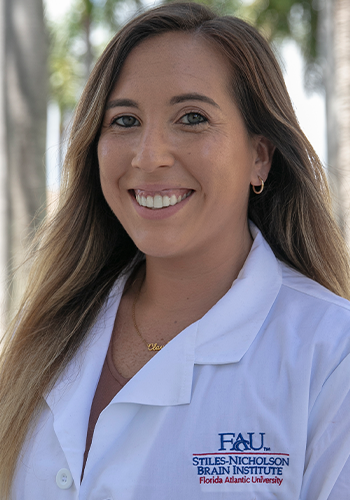
Entered: Neuroscience Graduate Program 2022 (GNTP 2021)
Mentor: Ali Danesh, Ph.D.
Thesis Topic: The characterization of vestibular dysfunction and cognitive impairment in Parkinson’s Disease
BS Behavioral Neuroscience & Psychology, Randolph-Macon College
“I am investigating the clinical characteristics of vestibular dysfunction and cognitive impairment in Parkinson’s Disease (PD) in Dr. Ali Danesh’s lab. My work focuses on understanding characteristic measures of postural control, eye movements and cognitive abnormalities in PD and how these variables can contribute to both fall risk and a diminished quality of life in this population. In addition, these variables have potential for future therapeutic intervention in PD. My prior work involved research in a molecular biology lab setting, where I studied the correlation between the peripheral effects of exercise in modulation of adult neurogenesis and neuroinflammation in the central nervous system. Following my undergraduate work, I was employed at Radius TBI of South Florida, where I worked as a Clinical Research Coordinator. Here I studied the use of oculo-motor function as a potential non-invasive biomarker of mild cognitive impairment. I was attracted to the Neuroscience program at FAU because of its multidisciplinary approach to the field of neuroscience. The structure of the program was very appealing, because it provides students with the opportunity to have a rotation within each of these disciplines when making the decision of which PhD to further pursue."
INSTITUTE NEUROSCIENCE TRAINEES (GNTP)
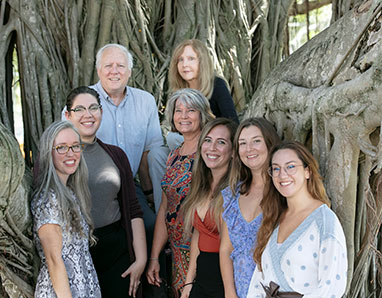
Right to left: Kylie Foster, Jennifer Giordano, Claudia Alvarez, Linda Petersen, Dr. Kate Guthrie, Dr. Randy Blakely, Gianna Cannestro, Bethany O'Donnellr
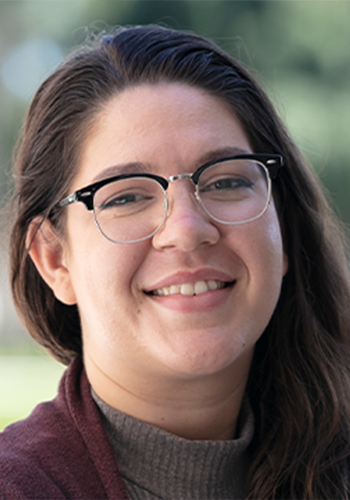
Entered: Graduate Neuroscience Training Program 2021
GNTP Affiliate Program: Complex Systems and Brain Sciences
Mentor: Jenny Wei, Ph.D.
Thesis Topic: Electrophysiological characterization of Huntington's disease using human-derived iPSCs
BS Biological Sciences, Florida Atlantic University
BA Health Sciences, Florida Atlantic University
Diversity in Science ~ Gianna earned the McKnight Doctoral Fellowship! This fellowship was created for students pursing doctorate degrees at Florida universities to build equity, diversity and inclusion for under representation of African American and Hispanic populations for those in pursuit of a career in research and teaching at a college or university level. This fellowship provides tuition up to $5,000 per year, and a $12,000 annual stipend.
"I am interested in studying Huntington's disease (HD) and how it affects the morphology and communication between neurons. I have been working with FAU faculty to present and publish work on the usage of iPSCs as a model for HD. In my first year with the GNTP I rotated in labs with Drs. Jenny Wei, Larry Toll, and Summer Sheremata, and have been pursuing my research in Dr. Wei's lab. I am investigating how the disease affects cells singularly but also in communication across networks of cells. By understanding the relationship between the disease and the presentation at the cellular level, we may be able to identify areas for therapeutic targets. "
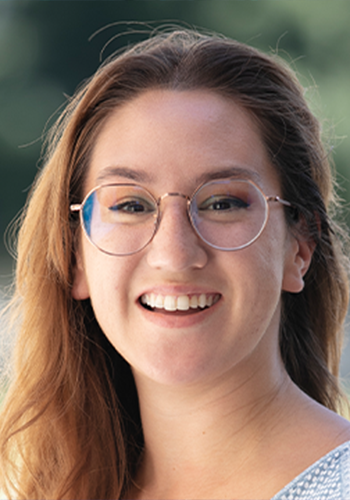
Entered: Graduate Neuroscience Training Program 2021
GNTP Affiliate Program: Integrative Biology/Neuroscience
Mentor: Larry Toll, Ph.D.
Thesis Topic: Exploration of Neural Signaling Mediating Sex-specific Behaviors in Comorbid
Alcohol Use Disorder (AUD) and Post-Traumatic Stress Disorder (PTSD)
BA Psychology, California State University, Long Beach, CA
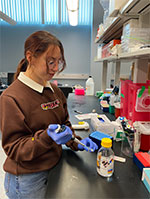
"I majored in Psychology and conducted research in Community Psychology and Neuropsychology at California State University, Long Beach. I rotated in labs with Dr. Lucia Carvelli, Dr. Robert Vertes, and Dr. Larry Toll.
Sex has been implicated as a key factor contributing to alcohol use disorder (AUD) vulnerability, with males being more susceptible. In contrast, post-traumatic stress disorder (PTSD) is more prevalent in females than males. Through my research in Dr. Toll’s lab, I aim to better understand the role of sex at the intersection of alcohol and stress processing within the brain. Males and females have differing perceptions and motivations towards alcohol at various ages and stages of life. These differences cause a cascade of changes to the neural system which subsequently results in sex differences in treatment outcomes for the treatment of AUD. A review of current pharmacotherapies prescribed for AUD management have a large array of outcomes that are mainly driven patient-specific attributes like initial health status, environmental support, and sex. Similarly, medications for the treatment of PTSD do not show consistent results. An experimental benefit of comparing the neurobiology of AUD to comorbid AUD-PTSD is that neurobiological changes in humans with PTSD is highly dependent upon environmental factors. PTSD is more commonly seen in patients with a history of other psychiatric disorders and the complexities of these co-occurrences result in reduced efficacy of pharmacotherapies for the treatment of PTSD. It is imperative for us to more closely investigate neural circuitry mediating alcohol use disorder and comorbid posttraumatic stress disorder to dissect the compounding effect on the brain. The reciprocal relationship between AUD and PTSD in both clinical and preclinical studies demonstrate the necessity for a treatment designed to address their comorbidity.
I was drawn to the program because there are a multitude of labs that emphasize interdisciplinary and collaborative research. I was also impressed by the level of involvement the Brain Institute has with the communities surrounding FAU. I came from an underserved area, and I am thankful that with this program, I will be in a position to help young students from similar communities."
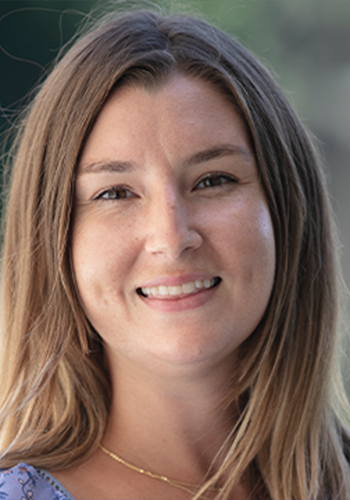
Entered: Graduate Neuroscience Training Program 2021
GNTP Affiliate Program: Complex Systems and Brain Sciences
Mentor: Erik Engeberg, Ph.D.
MA Psychology/Psychological Science, University of North Carolina at Wilmington
BA Psychology, University of North Carolina at Wilmington
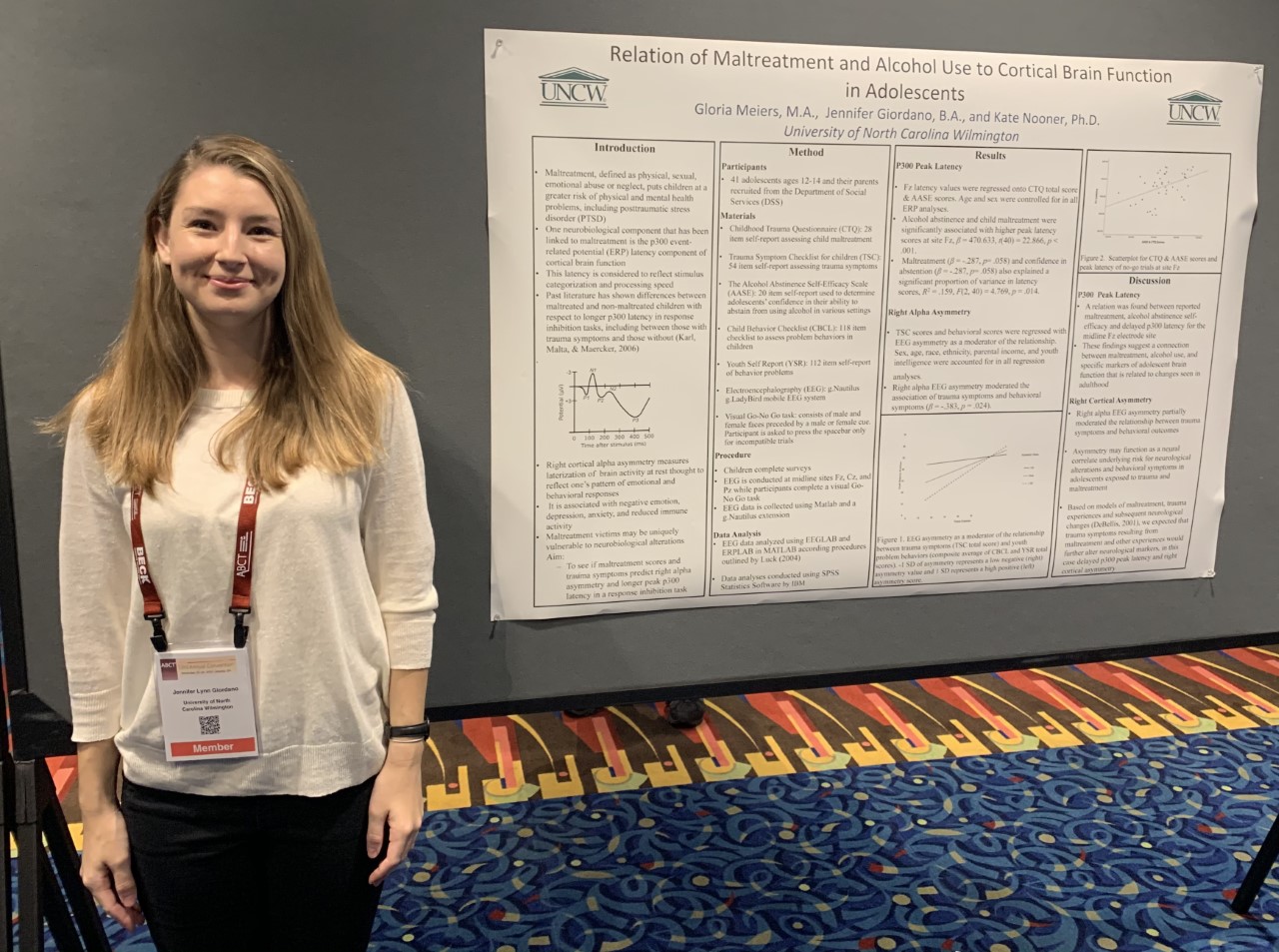
"I received my BA in Psychology and MA in Psychological Science from the University of North Carolina at Wilmington. During this time, I worked on a variety of research projects relating to traumatic brain injury and brain development using neuroimaging techniques, like EEG and fMRI. Recently, I have been interested in learning more about the aging process and the factors that influence neurodegenerative disease. I rotated in labs with Dr. Jenny Wei, Dr. Chad Forbes, and Dr. William Hahn, and will pursue my research in Dr. Hahn's lab. I was initially attracted to the GNTP because of its interdisciplinary approach and the opportunity to explore my research interests through lab rotations. The exceptional resources at FAU combined with beautiful South Florida weather made the GNTP an easy choice!"
In this photo, I was presenting my lab's research during a poster session in 2019 at the Annual Conference for the Association of Behavioral and Cognitive Therapies (ABCT) that was held in Atlanta, Georgia.
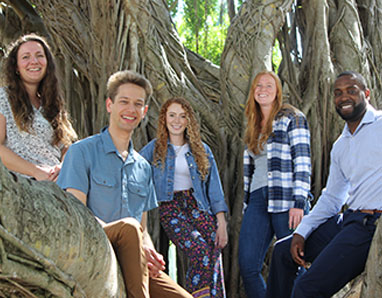
Left to Right: Allison Walsh, Stephen Hoover, Madeline Martinez, Lindsey Pugh, and Claudius Osei
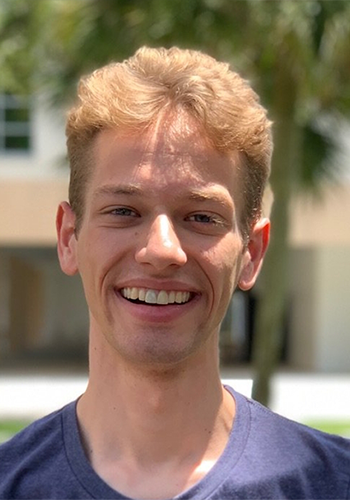
Entered: Graduate Neuroscience Training Program 2020
Ph.D. candidate in Complex Systems and Brain Sciences
Mentor: Ashkaan Fahimipour, Ph.D.
Thesis Topic: Solutions to Alignment Failures in General Learning Algorithms
B.S. (Hons.) in Mathematics, Florida Atlantic University, Boca Raton, FL
M.S. in Artificial Intelligence, Florida Atlantic University, Boca Raton, FL
Stephen is interested in computational neuroscience, specifically learning algorithms and artificial intelligence. Stephen's research focuses on developing algorithms that learn to achieve goals without causing catastrophic consequences. His work is mostly about artificial intelligence safety, particularly alignment and reportability.
Lab rotations during the first year in the labs of Drs. William Alexander, William Hahn, Elan Barenholtz, and Dr. Sarah Stern @ Max Planck Florida Institute for Neuroscience (MPFI).
"I was attracted to the GNTP because of the freedom and resources to achieve my goals. My rotations were in the labs of Drs. William Alexander, William Hahn, Elan Barenholtz and with Dr. Sarah Stern @ Max Planck Florida Institute for Neuroscience (MPFI). Now that I've completed rotations, I am working on two projects. The first uses mathematics to predict and control the behavior of generally intelligent, artificial agents. The goal of this project is to use create constraints so that artificial intelligence (AI) systems are beneficial instead of dangerous. The problem I'm trying to solve has a wide range of applications in science and industry by making machine learning systems more reliable and safer to deploy. My second project uses computer vision and machine learning to increase the wellbeing of animals in a research setting while increasing efficacy of certain experiments that require animal subjects."
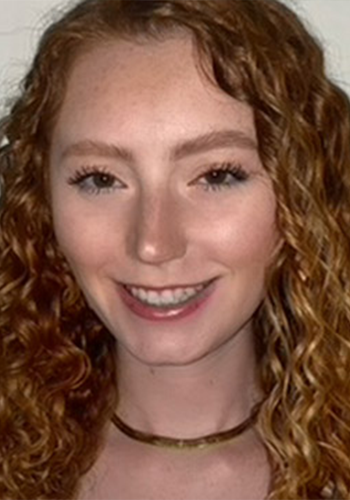
Entered: Graduate Neuroscience Training Program 2020
GNTP Affiliate Program: Integrative Biology/Neuroscience
Mentor: Lawrence Toll, Ph.D.
Thesis Topic: TBD
Neuroscience Student Organization Membership Coordinator
MS Neuroscience, Tulane University, New Orleans, Louisiana
BS Neuroscience & Cognitive Science emphasis Neurobiology, University of Arizona
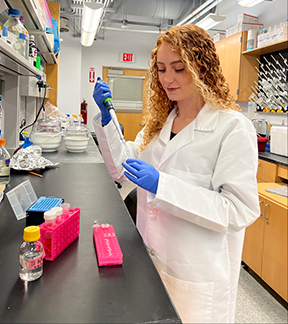
"I am particularly interested in the neurobiological changes resulting from substance use, and the epigenetic component of addiction. I am currently working on generating a new transgenic rodent line that can be used to study the role of mu opioid receptors in addiction. My three lab rotations were in the labs of Drs. Lucia Carvelli, Ning Quan, and Lawrence Toll. The interdisciplinary and collaborate culture of the GNTP enticed me to apply, and I encourage you to as well!"
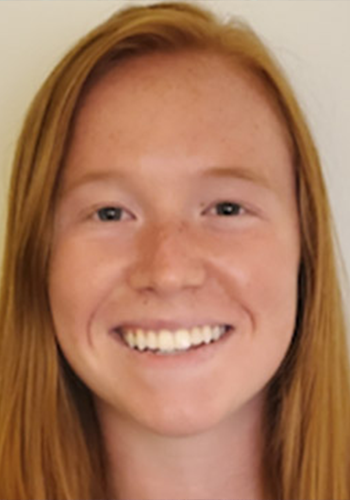
Entered: Graduate Neuroscience Training Program 2020
GNTP Affiliate Program: Experimental Psychology
Mentor: Dr. Alan Kersten
Thesis Topic: Effects of Emotional Objects on Associative Memory for Events
Dissertation Topic: Weapon Presence on Feature Memory in Eyewitness Memory
President Neuroscience Student Organization
BS Neuroscience, Susquehanna University, Selinsgrove, PA
"I am interested in metacognition, working memory, and emotion. My master's thesis looked at how emotionally charged objects (such as weapons) can affect the ability of viewers to remember certain aspects of an event. Currently, I am working on publishing a follow up project to my thesis where we are adding a source component to investigate how source variability can affect the same memory components as my thesis investigated. I have formulated my dissertation project which will focus on the effects of weapon presence on feature memory. This will help us to better understand how people view armed crimes and how that can affect their memory when it comes time to interview them for who committed the crimes and what weapons were used. My three rotations were in the labs of Drs. Summer Sheremata, Gizelle Anzures, and Alan Kersten. I was attracted to the GNTP because of the ability to rotate in labs and explore different interests along with the ability to collaborate with other labs on projects. This program is great because it allows you to experience lab atmospheres before choosing which lab to join. My interests changed drastically once I was exposed to research I hadn't originally considered!"
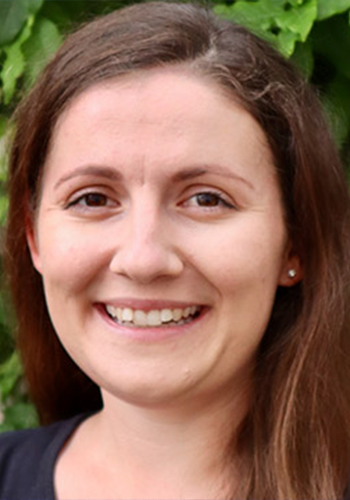
Entered: Graduate Neuroscience Training Program 2020
GNTP Affiliate Program: Integrative Biology/Neuroscience
Mentor: Randy D. Blakely, Ph.D.
Thesis Topic: Investigating the Link Between Serotonergic Signaling and Innate Immune Activation In Vivo
Masters in Public Health MPH Environmental Health & Toxicology, University of Alabama at Birmingham
BS Animal Science & Marine Biology, Auburn University, AL
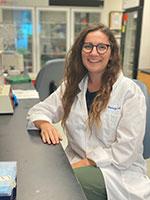
"My research interests in neuroscience are broadly-speaking, the interaction between our environment and health. My three GNTP lab rotations were in the labs of Drs. Erik Duboue, Randy Blakely, and Sarah Stern. I worked under Dr. Stern at MPFI for two semesters, investigating integrative circuits and complex behavior. The focus of our work was on the circuitry underlying feeding and its ability to be altered by environmental stimuli and stress. I moved to Dr. Blakely's lab in the spring 2022 semester to continue to pursue my research. As a neuroscience graduate student, I was attracted to the GNTP Ph.D. program at FAU for the many opportunities it offers, such as the close working relationship to the first German Max Planck Institute in the US. The available resources have allowed me the chance to study neuroscience in multiple animal models with cutting-edge technologies, in a diverse and collaborative environment, while enjoying South Florida living."
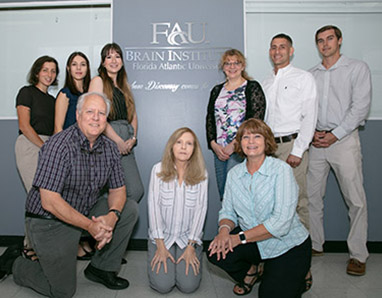
Standing, Kori Citrin, Goksu Oz, Amanda Rojas, Amanda Rainey, Ryan Gallagher & Donald Holder; Kneeling FAU Brain Institute - Dr. Randy Blakely, Executive Director, Dr. Kate Guthrie, Assistant Director for Educational Programs & Linda Petersen, GNTP Graduate Education Coordinator
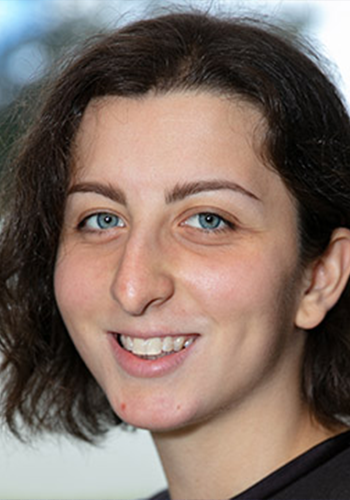
Entered: Graduate Neuroscience Training Program 2019
GNTP Affiliate Program: Integrative Biology/Neuroscience @ Max Planck Florida Institute for Neuroscience (MPFI)
Mentor: Yingxue Wang, Ph.D.
Thesis topic: Hippocampal Neuromodulatory Circuits
BS Psychology/Neuroscience, University of Connecticut, Storrs, CT
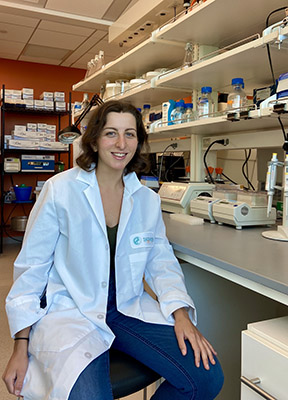
"I'm particularly interested in how and why the brain remembers certain events but not others. Under the guidance of Dr. Yingxue Wang at Max Planck Florida Institute for Neuroscience (MPFI), I am investigating the role of hippocampal neuromodulatory circuits in working memory. I was attracted to the GNTP because of the wealth of resources shared between FAU, MPFI, and Herbert Wertheim UF Scripps Institute. This gave me the ability to work in three GNTP lab rotations on the Jupiter campus with Dr. Carmen Varela, Dr. Sathya Puthanveettil at Herbert Wertheim UF Scripps Institute, and with my mentor Dr. Yingxue Wang at MPFI. While neuroscience is just one of many programs at other universities, at FAU Jupiter campus, brain research is the focal point."
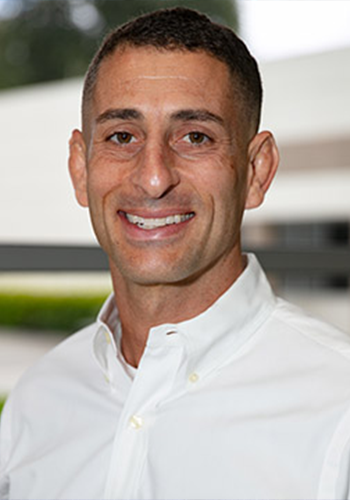
Entered: Graduate Neuroscience Training Program 2019
GNTP Affiliate Program: Complex Systems and Brain Sciences
Mentor: William Alexander, Ph.D.
Thesis topic: Decision-Making and Cognitive Control
BS Neuroscience & Behavior/Biological Sciences, Florida Atlantic University, Boca Raton, FL
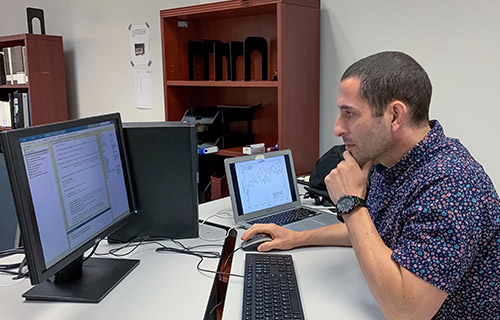
"I am particularly interested in value-based decision-making, reward processing and learning reinforcement. Currently under the tutelage of Dr. William Alexander, I am investigating how multiple informational cues are integrated to then be used in executing the appropriate behavior. I was attracted to the GNTP because of faculty and resources available that best allowed me to pursue my intellectual interests in lab rotations with Drs. Teresa Wilcox, Elan Barenholtz, and William Alexander. I hope you will consider joining our program!"
"I am working on fitting a computational model to data I had previously collected. The data was collected during a study that investigated learning rates and preferred sequencing of informational cues.
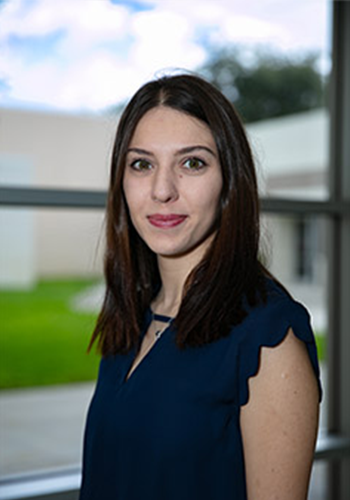
Entered: Graduate Neuroscience Training Program 2019
GNTP Affiliate Program: Integrative Biology/Neuroscience @ Max Planck Florida Institute for Neuroscience (MPFI)
Mentor: Ryohei Yasuda, Ph.D.
Thesis topic: The Roles of PKMζ and the other PKC Isoforms in the Maintenance of Long Term Memory
BA Psychology, Florida Atlantic University
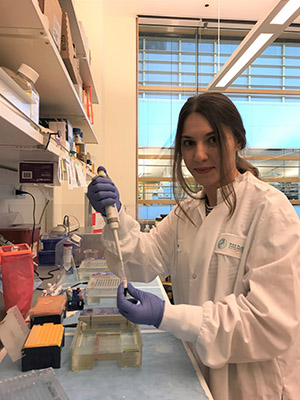
"I am interested in molecular basis of learning and memory. Currently under the tutelage of Dr. Ryohei Yasuda at Max Planck Florida Institute for Neuroscience, I am investigating the compensatory role of PKC isoforms in the maintenance of long-term memory. I was attracted to the GNTP because of the unique training opportunity that it provides to the first year Ph.D. students not only at FAU, but also in globally known institutions like Max Planck and Herbert Wertheim UF Scripps Institute. Florida Atlantic University is a rapidly progressing public university, especially in the field of life sciences, and we have already started to see the impact of FAU students and the alumni worldwide. I hope you will consider joining our GNTP team and contribute to this professional and supportive academic environment that the FAU Brain Institute has created."
"In this lab photo, I am filling the tiny pores on the agarose gel to conduct gel electrophoresis, which is technique that is used to sort the molecules based on their size differences."
ALUMNI GNTP
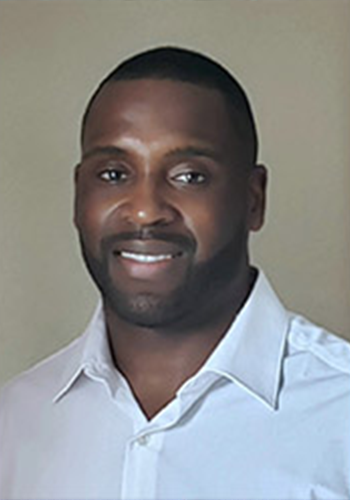
Ph.D. in Experimental Psychology / GNTP Student
Ph.D. Advisors: Andrzej Nowak, Ph.D. (Chair), David Bjorklund, Ph.D., Robin Vallacher, Ph.D., and Robert Gray, Ph.D.
Dissertation: Emerging Skill Acquisition: Differential Learning of a Basketball Shooting Task
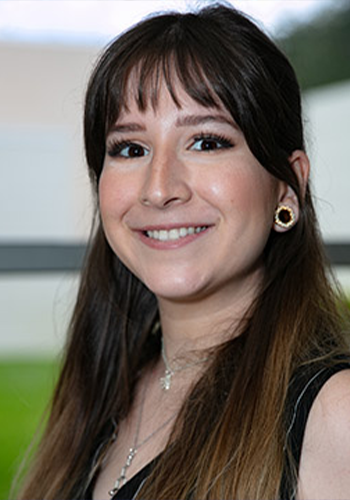
Ph.D. in Complex Systems and Brain Sciences / GNTP Student
Amanda looks to pursue a career in scientific publishing with PLoS One.
Ph.D. Advisors: Dr. Robert Vertes, Dr. Robert Stackman, Dr. Henriette Van Praag, and Dr. Stephanie Linley (University of North Colorado)
Dissertation: The Role of the Paratenial Nucleus and Nucleus Reuniens of the
Midline Thalamus in Cognition and Affect
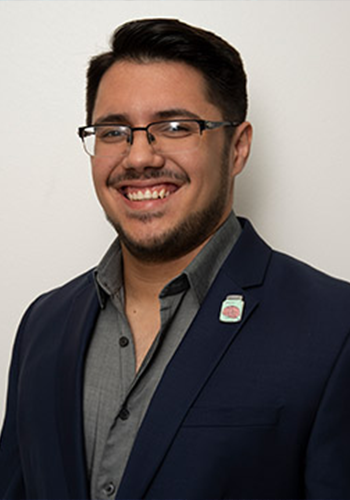
Ph.D. in Experimental Psychology / GNTP Student
Ph.D. Advisor: Sang Wook Hong, Ph.D.
Dissertation: Decoding of Face Stimuli in Basic Facial Expression and Anti-Expression Conditions
Neuroscience Student Organization Community Relations Officer
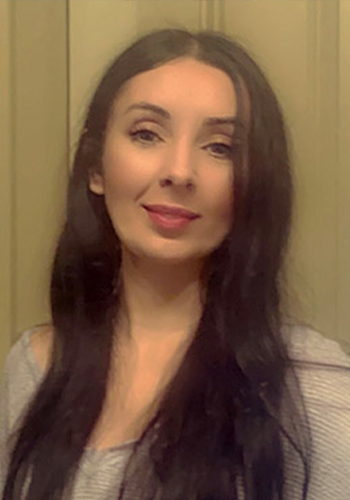
Ph.D. in Complex Systems and Brain Sciences / GNTP Student
Postdoctoral fellowship with Dr. Chad Forbes and Dr. Susan Schneider at FAU
Ph.D. Advisors: Dr. William Hahn, FAU, and Dr. Edward Ester, University of Nevada
Dissertation: Mechanisms of Selective Attention in Working Memory, Modeled from Human’s Alpha Band Oscillations
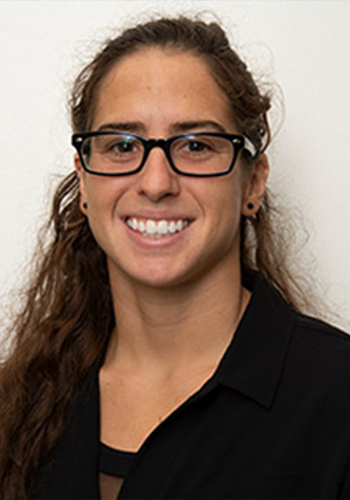
Ph.D. in Integrative Biology/Neuroscience
Postdoctoral Fellow Assistant to the Director of community Engagement and Programming, Stiles-Nicholson Brain Institute
Ph.D. Advisor: Erik Duboue, Ph.D.
Dissertation: The characterization of a simple startle circuit in Astyanax mexicanus
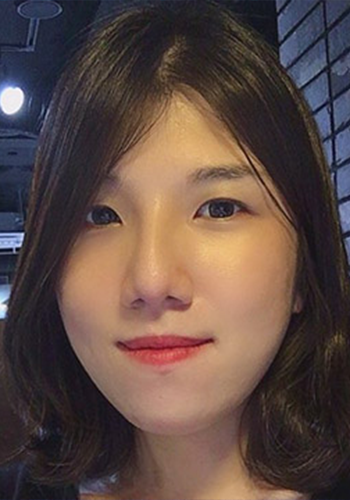
Ph.D. in Experimental Psychology
Postdoctoral fellowship with Dr. Sang Wook Hong
Ph.D. Advisor: Sang Wook Hong, Ph.D.
Dissertation: Individual Difference in Binocular Rivalry Dynamics
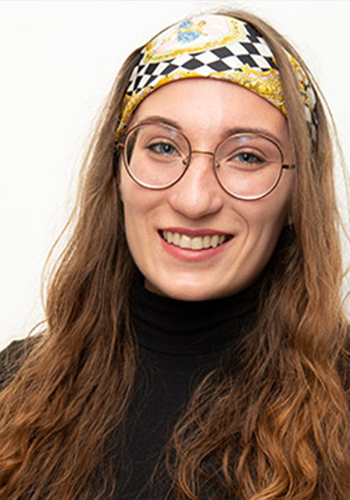
Ph.D. in Complex Systems and Brain Sciences / GNTP
Hi-tech start-up company in AGI
Ph.D. Advisor: Dr. Elan Barenholtz, Dr. William Han, and Dr. Susan Schneider
Dissertation: Preserving Knowledge in Simulated Behavioral Action Loops